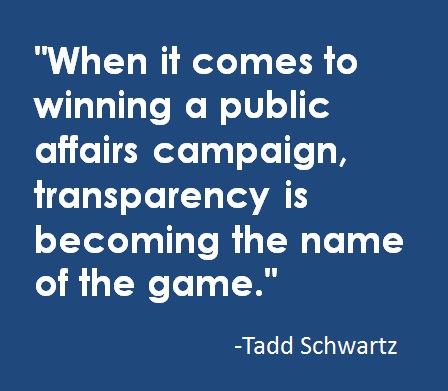The Miami Herald’s Naked Politics blog reports on the expanding role of public relations firms specializing in high-stakes political affairs and ballot initiatives at the local and state level.
Given our work representing Miami Beckham United, Walmart, the Sony Open tennis tournament, South Beach ACE in its quest to redevelop the Miami Beach Convention Center, and the Miami Downtown Development Authority, we have honed our skills developing and leading campaigns of this nature.
Our very own Tadd Schwartz is included in the story, speaking to how a well-managed public relations campaign can complement a government affairs strategy by educating and engaging the general public — all in the interest of transparency.

By Patricia Mazzei
The new operatives roaming the halls of local South Florida governments come from political campaigns and public-relations firms, not from high-powered law firms that usually supply big-name lobbyists. In some cases, the consultants aren’t lobbyists at all. They don’t write legislation. They care less about how elected officials will vote and more about what the public will think.
The shift might appear subtle. But appealing to public opinion –- more like an advertising firm launching a product or a political campaign promoting a candidate –- has become big business in the competitive world of Miami public relations.
Consider the most significant proposals that have come recently before local governments: David Beckham’s Major League Soccer stadium. The Miami Dolphins’ renovations to Sun Life Stadium. The Miami Beach Convention Center. Miami-Dade County’s new sewer pipes. Uber’s and Lyft’s push to legalize rides-for-hire.
 All have involved deep-pocketed companies hiring firms such as Schwartz Media Strategies, Balsera Communications and Kreps DeMaria not to speak to politicians but to shape public opinion to reporters and on social media.
All have involved deep-pocketed companies hiring firms such as Schwartz Media Strategies, Balsera Communications and Kreps DeMaria not to speak to politicians but to shape public opinion to reporters and on social media.
There’s still a role for attorneys and more traditional lobbyists, of course, and some have long mounted mini-campaigns of their own, appearing on television and radio shows to plug their clients. Elected officials still like to be catered to directly.
But with the rise of the Internet, public-affairs campaigns give politicians cover to have their constituents persuaded directly, too. And government appears to be in a perennial campaigning state.
“When it comes to winning a public affairs campaign, transparency is becoming the name of the game,” said Tadd Schwartz of his namesake firm. “Lobbyists play an important role in influencing policy, but clients recognize there’s value in educating and engaging the public through traditional and digital media platforms.”Read the full story here.




 See More Blogs
See More Blogs
Comments